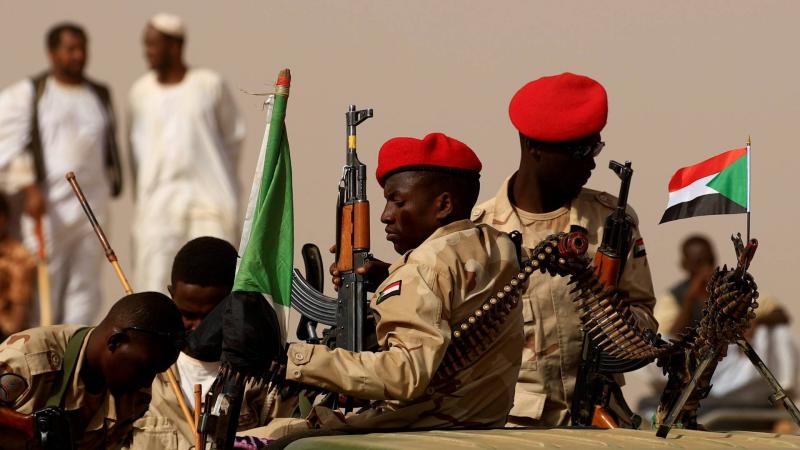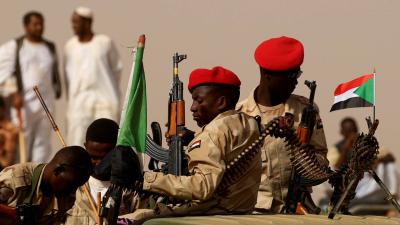The Rapid Support Forces announced the extension of the humanitarian ceasefire for 72 hours starting from midnight tonight to open humanitarian corridors, facilitate the movement of citizens and residents, and allow them to meet their needs and reach safe areas, in response to international, regional, and local calls. The Sudanese army also announced its agreement to extend the ceasefire.
Fighting renewed between the Sudanese army and the Rapid Support Forces in various areas of the capital, Khartoum, while relative calm prevailed in other parts of the city. The ceasefire agreement between the two sides entered its second day amidst mutual accusations of violations. During this time, the United Nations mission announced that both the army and the Rapid Support Forces had appointed military leaders for the upcoming negotiations. Reports indicated violent clashes occurring between the army and the Rapid Support Forces in the Al-Hafaya suburb north of Bahri city.
In this context, the Sudanese army stated on Sunday that "indiscriminate shelling and the looting of public and private properties, including banks, shops, and citizens' homes are ongoing," asserting that "the armed forces continue to monitor rebel movements in every inch of the country and will confront and thwart them forcefully." The Sudanese army’s statement also noted that "it will continue to evacuate foreign nationals from Wadi Sidna Airbase, which currently faces no threats and is not expected to be affected by any threats."
Additionally, the Sudanese Foreign Ministry condemned in a statement "the brazen attacks on diplomatic missions by the Rapid Support Forces," calling on the international community to denounce "the criminal behavior" and affirming its commitment to "the safety and security of diplomatic premises." In parallel, authorities announced the deployment of a large police force from the Central Reserve Unit in the neighborhoods of Khartoum to protect citizens and their properties, marking the first time police entered the field since the outbreak of war two weeks ago. The Sudanese army stated, "We are continuing to create suitable conditions for police to gradually patrol the streets in conjunction with clearing operations."
Moreover, the Sudanese Interior Ministry indicated that "the Central Reserve Forces, a police faction, went into the field yesterday to secure markets and properties."
**Call for Ceasefire**
Djibouti's Foreign Minister Mahmoud Ali Yusuf expressed concern over the "expansion of the conflict in Sudan," stating that "the collapse of the state has catastrophic consequences for the continent." He noted that "the dispatch of the presidents of South Sudan, Djibouti, and Kenya to Khartoum is pending improvements in the security situation there," pointing out that "the failure of ceasefires is due to the lack of communication between the battling parties and a real need for communication to sustain the ceasefires."
For its part, the Saudi Foreign Ministry announced that "Minister Faisal bin Farhan is receiving the special envoy of the head of the Sudanese Transitional Sovereignty Council to discuss the current situation," adding that "Farhan reaffirmed Riyadh's call for de-escalation and an end to all forms of escalation in Sudan."
**Evacuation Operations Ongoing**
The British government announced "a special evacuation flight on May 1 to assist British nationals in leaving Port Sudan," revealing that "the total number evacuated from Sudan on British flights has reached 2,122 individuals." Foreign Secretary James Cleverly stated in a statement: "Our rescue efforts from Port Sudan are ongoing. We continue to do everything we can to secure a long-term ceasefire, a stable transition to civilian rule, and end the violence in Sudan."
Two American officials confirmed to Reuters that the United States has sent a Navy ship to Sudan to aid in evacuating American citizens. They stated that the USS Brunswick is a fast transport ship temporarily located in Port Sudan. U.S. State Department spokesperson Matthew Miller noted on Sunday that American citizens and others eligible to join the caravan will head to Saudi Arabia, where personnel are stationed to facilitate emergency travel. Indonesia's Foreign Ministry reported that another group of 363 Indonesian citizens returned to the country on Sunday after being evacuated from Sudan on a second flight by Garuda Indonesia.
The Foreign Ministry stated, "The Indonesian government has also assisted in evacuating several foreign nationals," without providing details on the number of foreigners evacuated by Indonesia. The first group of Indonesians evacuated from Sudan had returned to the country on Friday, totaling 748 Indonesian citizens evacuated from Sudan to date. Additionally, the Palestinian Foreign Ministry began evacuating about 120 of its nationals from Sudan on Sunday.
Political Advisor to the Minister of Foreign Affairs Ahmed Deek said in a statement that "two buses carrying 118 citizens departed today from Khartoum towards the Arqin border crossing between Sudan and Egypt," adding, "The Palestinian embassy in Cairo is sending buses to the crossing to receive citizens and ensure their transfer to the Rafah crossing."
Reuters reported on Wednesday that Deek stated, "So far, we have evacuated 300 of our nationals from Sudan from the West Bank and Gaza Strip, and there are still 200 in Khartoum, along with more in other states." For her part, Canadian Defense Minister Anita Anand stated on Sunday that Canada had suspended its evacuation operations from Wadi Sidna Airbase near Sudan's capital Khartoum due to the dangerous situation and ongoing instability in the field. She stated, "Due to the dangerous situation and in coordination with the decisions made by our allies, no further Canadian evacuation flights will be made from Wadi Sidna Airbase."
She added, "Approximately 230 Canadians are still in Sudan seeking assistance and information from the Canadian Foreign Ministry," noting that the government is working with allies to find alternative departure options, including through Port Sudan.
**Humanitarian Aid Arrives in Port Sudan**
Life-saving medical supplies left Amman, Jordan for Port Sudan on Sunday as part of emergency operations by the International Committee of the Red Cross following the outbreak of the conflict in Sudan. The humanitarian shipment, which weighs 8 tons, includes surgical materials to support Sudanese hospitals and volunteers from the Sudanese Red Crescent Association providing medical care to the wounded in the fighting.
Patrick Youssef, the regional director for Africa at the International Committee of the Red Cross, stated, "Since April 14, no one has been able to deliver medical assistance to the country desperately in need of it," hoping that "this medical assistance will be quickly transported from Port Sudan and delivered to the hospitals that urgently need it, which already requires a ceasefire that both sides must respect so that we, alongside our colleagues from the Sudanese Red Crescent, can deliver these items to the hospitals as soon as possible and allow medical staff, doctors, nurses, and first aid volunteers to do their work."
The medical shipment includes anesthetics, bandages, surgical threads, and other surgical materials that can treat thousands of people who may have been injured by weapons. As hostilities continue, the ICRC teams will need assurances for safe passage from the conflicting parties to deliver these materials to medical facilities in active combat zones, such as Khartoum. Meanwhile, the Sudanese Doctors Syndicate announced that the number of civilian deaths has risen to 425 and injured to 2,091 since the onset of hostilities.
ICRC spokeswoman in Sudan Iman Traboulsi stated in an interview with Al Jazeera that "the situation regarding the delivery of medical assistance has improved."
**The Big Conspiracy...**
The Sudanese army accused entities both domestically and internationally of planning what it referred to as "the big conspiracy," which it claimed had been thwarted due to the resilience of the armed forces. A statement from army spokesman Nabil Abdullah asserted that what had been foiled over the past two weeks was "a failed attempt to seize power by the rebels under full political cover, which is a project to hijack the Sudanese state for the personal benefit of one individual."
The statement added that the maneuvers conducted in recent months aimed to "destroy the army and the security system in the country," to be replaced by "rebel militias." The Sudanese army vowed to hold accountable those it labeled "betrayers who sold the nation’s cause for cheap gain," adding that the Sudanese people "will reject them for supporting those who killed its children, looted its properties, and destroyed its institutions." The army considered all "attempts by the rebels and their allies, domestically and abroad, to market their project based on deceiving people and distorting the truth, have failed."
The army emphasized that it "will not be a tool or a lever for any entity or party to seize power," reaffirming its commitment to "the political process that leads to the establishment of civilian authority." On its part, the Rapid Support Forces announced that it had managed to shoot down a MiG aircraft belonging to the Sudanese army in the city of Omdurman, accusing the army in a statement of "violating the humanitarian ceasefire and attacking its forces with airstrikes" in various locations and residential neighborhoods in Khartoum.
The Rapid Support Forces warned in a statement yesterday the police leadership against engaging in the ongoing battles and urged them to withdraw all members from participation in the field, noting that a force from the Central Reserve Police joined the army in the Shajara area south of Khartoum "and is preparing to attack areas where our forces are stationed."




